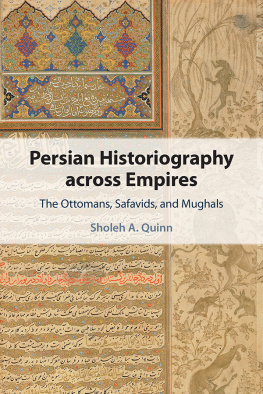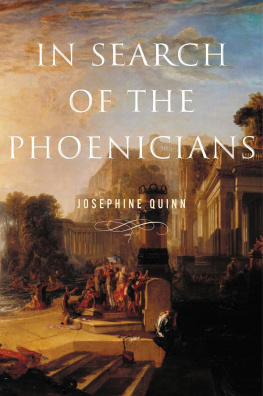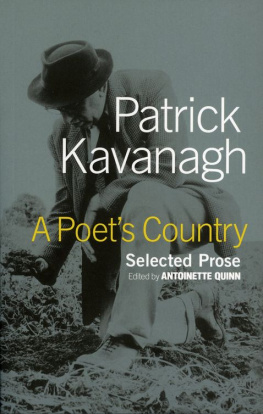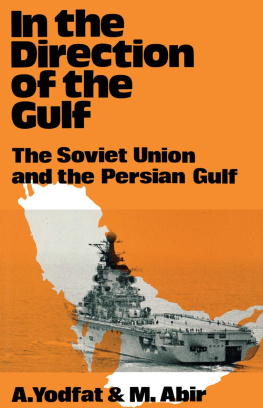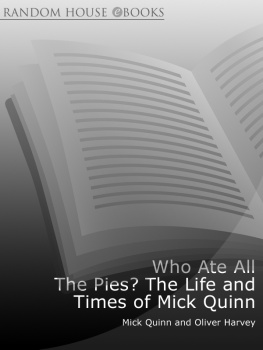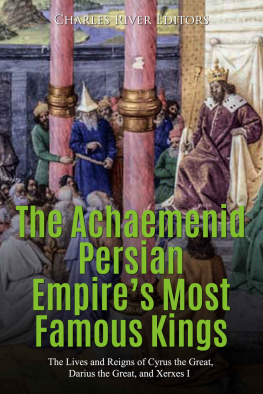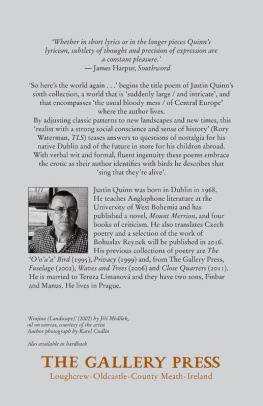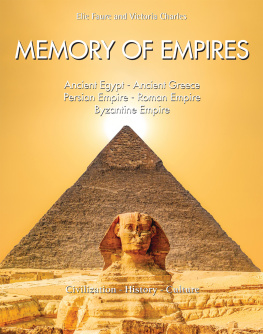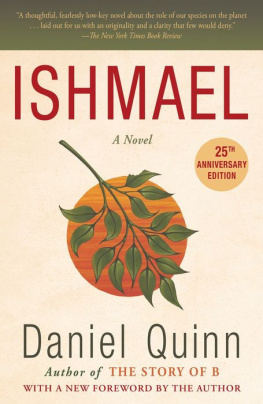Quinn - Persian Historiography across Empires
Here you can read online Quinn - Persian Historiography across Empires full text of the book (entire story) in english for free. Download pdf and epub, get meaning, cover and reviews about this ebook. year: 2020, publisher: Cambridge University Press, genre: Religion. Description of the work, (preface) as well as reviews are available. Best literature library LitArk.com created for fans of good reading and offers a wide selection of genres:
Romance novel
Science fiction
Adventure
Detective
Science
History
Home and family
Prose
Art
Politics
Computer
Non-fiction
Religion
Business
Children
Humor
Choose a favorite category and find really read worthwhile books. Enjoy immersion in the world of imagination, feel the emotions of the characters or learn something new for yourself, make an fascinating discovery.
Persian Historiography across Empires: summary, description and annotation
We offer to read an annotation, description, summary or preface (depends on what the author of the book "Persian Historiography across Empires" wrote himself). If you haven't found the necessary information about the book — write in the comments, we will try to find it.
Quinn: author's other books
Who wrote Persian Historiography across Empires? Find out the surname, the name of the author of the book and a list of all author's works by series.
Persian Historiography across Empires — read online for free the complete book (whole text) full work
Below is the text of the book, divided by pages. System saving the place of the last page read, allows you to conveniently read the book "Persian Historiography across Empires" online for free, without having to search again every time where you left off. Put a bookmark, and you can go to the page where you finished reading at any time.
Font size:
Interval:
Bookmark:

Persian Historiography across Empires
Persian served as one of the primary languages of historical writing over the period of the early modern Islamic empires of the Ottomans, Safavids, and Mughals. Historians writing under these empires read and cited each others works, some moving from one empire to another, writing under different rival dynasties at various points in time. Emphasizing the importance of looking beyond the confines of political boundaries in studying this phenomenon, Sholeh A. Quinn employs a variety of historiographical approaches to draw attention to the importance of placing these histories within not only their historical context but also their historiographical context.
This comparative study of Persian historiography from the sixteenth to the seventeenth centuries presents in-depth case analyses alongside a wide array of primary sources written under the Ottomans, Safavids, and Mughals to illustrate that Persian historiography during this era was part of an extensive universe of literary-historical writing.
Sholeh A. Quinn is Associate Professor of History at the University of California, Merced. She is the author of Historical Writing during the Reign of Shah Abbas: Ideology, Imitation, and Legitimacy in Safavid Chronicles (2000) and Shah Abbas: The King Who Refashioned Iran (2015). She co-edited History and Historiography of Post-Mongol Central Asia and the Middle East: Studies in Honor of John E. Woods (2006).
Persian Historiography across Empires
The Ottomans, Safavids, and Mughals
Sholeh A. Quinn
University of California, Merced


University Printing House, Cambridge CB2 8BS, United Kingdom
One Liberty Plaza, 20th Floor, New York, NY 10006, USA
477 Williamstown Road, Port Melbourne, VIC 3207, Australia
314321, 3rd Floor, Plot 3, Splendor Forum, Jasola District Centre, New Delhi 110025, India
79 Anson Road, #0604/06, Singapore 079906
Cambridge University Press is part of the University of Cambridge.
It furthers the Universitys mission by disseminating knowledge in the pursuit of education, learning, and research at the highest international levels of excellence.
www.cambridge.org
Information on this title: www.cambridge.org/9781108842211
DOI: 10.1017/9781108906975
Sholeh A. Quinn 2021
This publication is in copyright. Subject to statutory exception and to the provisions of relevant collective licensing agreements, no reproduction of any part may take place without the written permission of Cambridge University Press.
First published 2021
A catalogue record for this publication is available from the British Library.
Library of Congress Cataloging-in-Publication Data
Names: Quinn, Sholeh Alysia, author.
Title: Persian historiography across empires : the Ottomans, Safavids, and Mughals / Sholeh A. Quinn, University of California, Merced.
Description: First edition. | New York : Cambridge University Press, 2020. | Includes bibliographical references and index.
Identifiers: LCCN 2020021031 (print) | LCCN 2020021032 (ebook) | ISBN 9781108842211 (hardback) | ISBN 9781108820387 (paperback) | ISBN 9781108906975 (epub)
Subjects: LCSH: IranHistoriographyHistory16th century. | IranHistoriographyHistory17th century. | IranHistoryafavid dynasty, 1501-1736Historiography. | TurkeyHistoryOttoman Empire, 1288-1918Historiography. | Mogul EmpireHistoriography.
Classification: LCC DS292 .Q565 2020 (print) | LCC DS292 (ebook) | DDC 950/.3072dc23
LC record available at https://lccn.loc.gov/2020021031
LC ebook record available at https://lccn.loc.gov/2020021032
ISBN 978-1-108-84221-1 Hardback
Cambridge University Press has no responsibility for the persistence or accuracy of URLs for external or third-party internet websites referred to in this publication and does not guarantee that any content on such websites is, or will remain, accurate or appropriate.
For my husband
Stephen N. Lambden
This book has been a long time in the making, and it would not have been possible for me to complete it without a great deal of support and assistance from family, friends, and colleagues. I am grateful to Necati Alkan, Susan Amussen, Ali Anooshahr, Sussan Babaie, Shahzad Bashir, Jennifer Berry, Evrim Binba, Aditi Chandra, Ferenc Csirks, Devin DeWeese, Novin Doostdar, Massumeh Farhad, Kioumars Ghereghlou, Mana Kia, Nobuaki Kondo, Paul Losensky, Louise Marlow, Charles Melville, Firuza Melville, Colin Mitchell, Ruth Mostern, Judith Pfeiffer, Kaya ahin, Hamid Samandari, Ron Sela, Tun en, Marta Simidchieva, Sunil Sharma, Tilmann Trausch, Audrey Truschke, and Ernest Tucker for their assistance with various aspects of this project.
Many thanks to Maria Marsh, Daniel Brown, Atifa Jiwa, Thomas Haynes, and the team at Cambridge University Press, and Vinithan Sethumadhavan and his team at SPi Global for all of their assistance in helping this project reach completion. I am grateful to Pierke Bosschieter for preparing the Index. The three anonymous reviewers of my manuscript made many helpful comments and suggestions for improvement, and I am very thankful to them for their time and expertise. I take full responsibility, of course, for all errors and oversights.
I thank the University of California (UC) Merced Center for the Humanities and the UC Merced Faculty Senate Grant Program for providing research support for this project. UC Merced is a very special place. My distinguished colleagues in the Interdisciplinary Humanities Graduate Group, and the History and Critical Race and Ethnic Studies Department have always been very encouraging and supportive. The remarkable students at UC Merced, past and present, graduate and undergraduate, have been a constant source of inspiration.
My professor and friend, John Woods, has always provided me with wonderful advice and generously shared with me his vast knowledge of the Persianate world. Thank you so much.
The love and support from my family continues to sustain me in a deep and profound way. I am grateful to my precious parents, Robert Quinn and Manijeh Samandari Quinn; my sister, Laleh Quinn; and her partner, Doug Nitz. Finally, my beloved and learned husband, Stephen Lambden, has not only helped me through every step of this journey but also filled it with laughter and happiness.
In 933/1527, after an eventful career as a diplomat, historian, administrator, and writer under multiple rulers a career that included composing a variety of texts for multiple patrons Ghiyas al-Din Khvandamir (ca. 880942/ca. 14751535/1536) left Herat, a town which had recently come under Safavid control, and made his way to Qandahar and Mughal territory. There, he authored his final composition: a short historical treatise for the Mughal emperor Humayun (r. 937963/15301556). Khvandamirs career represents movement in a number of ways. In addition to his physical journey from Khurasan to India, he moved effortlessly, it seems, from genre to genre in his writing, and from patron to patron, some of whom were distantly related to each other and others who ruled over rival empires. Khvandamir was not unique in terms of his movements. The early modern Persianate world was one connected by a common Persian language and a body of texts familiar to an elite that existed across empires. However, while we know what, where, and when Khvandamir wrote, we have only started to understand how and why.
Font size:
Interval:
Bookmark:
Similar books «Persian Historiography across Empires»
Look at similar books to Persian Historiography across Empires. We have selected literature similar in name and meaning in the hope of providing readers with more options to find new, interesting, not yet read works.
Discussion, reviews of the book Persian Historiography across Empires and just readers' own opinions. Leave your comments, write what you think about the work, its meaning or the main characters. Specify what exactly you liked and what you didn't like, and why you think so.

